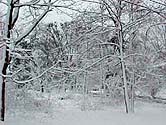
THURSDAY, March 27, 2014 (HealthDay News) — Here’s something that’s sure to alarm the millions of Americans who have braved the fiercest, longest winter in recent memory: A new study shows that your cholesterol levels fluctuate seasonally and are at their worst during cold winter months.
The research, which included 2.8 million adults, brings to stark light the potential effects of comfort food and bad weather on a person’s health during the winter.
“It’s not just some weight that you’re gaining” when you eat more and exercise less during the winter, said lead investigator Dr. Parag Joshi, a cardiology fellow at Johns Hopkins. “There are markers in your blood that are changing, and those markers contribute to heart disease.”
Researchers at Johns Hopkins Ciccarone Center for the Prevention of Heart Disease analyzed cholesterol levels in more than 2.8 million Americans between 2006 and 2013, according to findings that were to be presented Monday at the annual meeting of the American College of Cardiology in Washington, D.C.
The investigators categorized each sample by the time of year it was taken, based on the summer and winter equinoxes, and then compared samples across seasons.
The study found that levels of “bad” LDL cholesterol were 3.5 percent higher in men and 1.7 percent higher in women during colder months.
Women and men had variations in total cholesterol of approximately 2 milligrams per deciliter (mg/dL) and 4 mg/dL, respectively, between the summer and winter.
On the other hand, levels of “good” HDL cholesterol did not seem to vary much by season, the findings showed.
Earlier studies have had similar results, but this is the first study to observe the fluctuations in this large a group. “You generate a lot of power if you have nearly 3 million unique individuals to observe,” Joshi said.
The results make sense given the way people tend to respond to cold weather, said Dr. Gerald Fletcher, a cardiologist with the Mayo Clinic in Jacksonville, Fla., and a spokesperson for the American Heart Association.
The snow, rain and cold of winter tend to dissuade people from getting out and exercising, he said. Even folks with a gym membership may not feel like leaving their home to go for a workout.
At the same time, people’s cravings for fatty comfort foods increase, particularly around the holidays.
“People tend to not get out and exercise. They tend to eat things that are not healthy,” Fletcher said. “They hibernate, so to speak.”
People also get less sun exposure during the winter, which means that their concentrations of vitamin D will decrease, Joshi said. Studies have suggested that vitamin D appears to reduce “bad” LDL cholesterol levels.
Dr. Suzanne Steinbaum, a preventive cardiologist at Lenox Hill Hospital in New York City, added that people should not shrug off the potential health effects of these seasonal fluctuations in their blood cholesterol.
Even though people’s cholesterol will decrease during the summer, the high winter levels will contribute to hardening and blockage of the arteries, and increase their risk of heart disease and stroke, she said.
“There’s so much research out there about the effects that a high-fat diet can have on the lining of the arteries, even in a one-meal setting,” Steinbaum said. “It’s very easy to make excuses in the winter, for all of us, but we have to fight it. We have to pay more attention to what we’re eating and we need to get our exercise in.”
And, added Dr. Evelina Grayver, director of the Coronary Care Unit at North Shore University Hospital in Manhasset, N.Y., the cholesterol fluctuations also could point to other seasonal health effects.
“If we were to look at other cardiovascular risk factors like blood pressure and blood glucose, we likely would have the same findings as well,” Grayver said.
Joshi said that even if unhealthy winter habits have nothing to do with the rise in cholesterol levels, people will still benefit if they maintain year-round the exercise and healthy eating that comes so easily in the summer.
“At least the healthier habits will protect you from the cholesterol changes that are happening in the winter,” Joshi said.
However, he does not think that the levels fluctuate wildly enough that doctors should check cholesterol only at set times of the year, or test cholesterol repeatedly during the year.
“I don’t think there’s anything here to say we should change practice from a clinical level,” he said.
The data and conclusions of research presented at medical meetings should be viewed as preliminary until published in a peer-reviewed journal.
More information
Visit the U.S. National Library of Medicine for more on cholesterol.
Copyright © 2026 HealthDay. All rights reserved.

